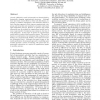Free Online Productivity Tools
i2Speak
i2Symbol
i2OCR
iTex2Img
iWeb2Print
iWeb2Shot
i2Type
iPdf2Split
iPdf2Merge
i2Bopomofo
i2Arabic
i2Style
i2Image
i2PDF
iLatex2Rtf
Sci2ools
114
click to vote
ADC
2004
Springer
2004
Springer
A Model of Dynamic Resource Allocation in Workflow Systems
Current collaborative work environments are characterized by dynamically changing organizational structures. Although there have been several efforts to refine work distribution, especially in workflow management, most literature assumes a static database approach which captures organizational roles, groups and hierarchies and implements a dynamic roles based agent assignment protocol. However, in practice only partial information may be available for organizational models, and in turn a large number of exceptions may emerge at the time of work assignment. In this paper we present an organizational model based on a policy based normative system. The model is based on a combination of an intensional logic of agency and a flexible, but computationally feasible, non-monotonic formalism (Defeasible Logic). Although this paper focuses on the model specification, the proposed approach to modelling agent societies provides a means of reasoning with partial and unpredictable information as is...
Related Content
| Added | 20 Aug 2010 |
| Updated | 20 Aug 2010 |
| Type | Conference |
| Year | 2004 |
| Where | ADC |
| Authors | Guido Governatori, Antonino Rotolo, Shazia Wasim Sadiq |
Comments (0)

